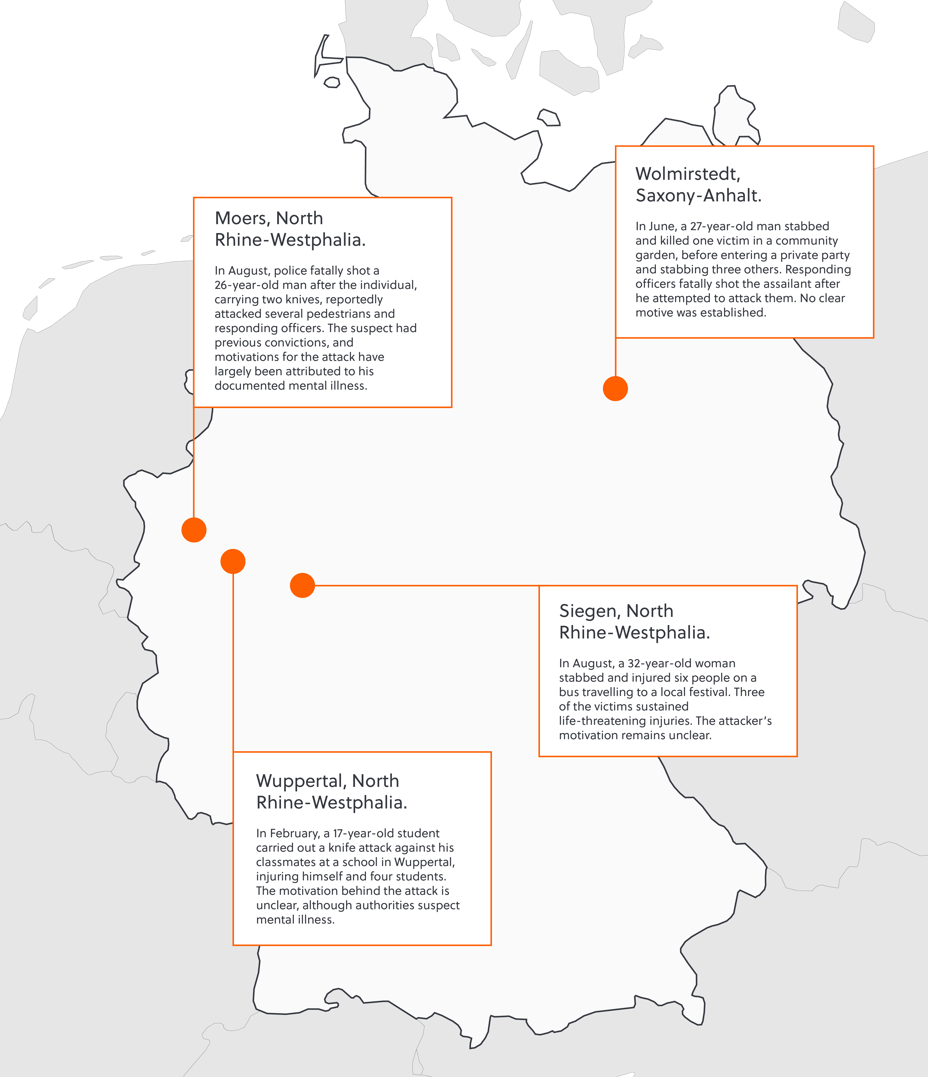Travellers in Europe remain more commonly affected by opportunistic petty crimes like pickpocketing and theft, rather than violent crimes like extortion and kidnapping.
However, the expanding global drug trafficking trade has bolstered the presence and activities of criminal groups in European countries, driving elevated ambient risks for travellers. These dynamics have led to upticks in violence in some urban areas, with Sweden’s military assisting police in combatting growing gun violence and gang-related bombings, while in Marseilles, France, members of the DZ Mafia gang attempted to extort and assassinate a prominent rapper for hundreds of thousands of euros. With criminal groups becoming increasingly emboldened, including clashing in public spaces, this will continue to impact the wider travel security environment in the coming years.
Regional Highlights
Extortion in Greece
In 2024, several public officials were arrested for involvement in two separate extortion syndicates that targeted the tourism and hospitality sector. In July, police arrested 14 members of a major extortion ring operated by civil servants in Athens, including municipal police and employees of the construction, sanitation and culture ministries. The group forced owners of food and beverage establishments in popular tourist destinations in the city and other island regions to pay bribes to avoid fines and lawsuits for spurious municipal code violations. Businesses were also required to pay several thousand euros in bribes to expedite the resolution of municipal issues, secure permits, or influence local council decisions, with reported extortion fees ranging between EUR 10,000 and 35,000 (USD 10,500 and 37,000) per service. A similar incident occurred in Corfu in October 2024, where law enforcement personnel arrested four tax officials and an accountant for successfully extorting around EUR 38,000 (USD 40,000) from business owners in exchange for overlooking unpaid taxes, in one case demanding EUR 60,000 (USD 63,000) from a company. Corruption among officials remains widespread in Greece, and will continue to drive such schemes against businesses.
Knife attacks in Germany
Germany has experienced an uptick in violent incidents in city centres and around public transportation in 2024. Federal police report that knife attacks, in particular, rose in the first half of 2024 relative to 2023, with around 430 incidents reported at train stations in the first six months of the year. Attackers do not specifically target travellers, and motivations behind these attacks vary significantly between incidents. In many cases, authorities are unable to establish clear motivations, although some acts have been attributed to the perpetrators' mental health, interpersonal disputes or to financially-motivated criminal activity. In the context of increasing political tensions regarding refugees and immigrants, exacerbated by far-right parties’ anti-immigration rhetoric, other cases have occasionally involved immigrants or asylum seekers acting on personal grievances, while at least one incident in Solingen has been linked to Islamist extremism.
Authorities have sought to prevent further attacks by strengthening restrictions, bans and penalties around owning and carrying certain bladed weapons. Restrictions are tighter in designated ‘weapons-free zones’ (WFZs), which include public transport stations and recreational areas, high crime areas in cities such as Cologne and Düsseldorf, and around train stations in Stuttgart and Hamburg. However, prevention efforts face challenges, with police citing concerns over capacity constraints in maintaining a bolstered personnel presence in these areas. Difficulties also arise in identifying potential threat actors in densely-populated areas like concert venues, markets or public gathering hotspots. While these measures may help to improve perceptions of safety in public spaces, and reduce the frequency of incidents in some cases, enforcement will remain difficult, as will anticipating such events. As such, there remains significant potential for additional incidents over the coming year, with tourist attractions and public gatherings such as cultural and sporting events likely to remain highly attractive targets for perpetrators.
Active assailant knife attacks in 2024

These active assailant incidents exclude attacks investigated or classified by police as acts of terrorism, hate crimes, or acts of violence in the course of interpersonal disputes, or financially-motivated crimes like muggings.





